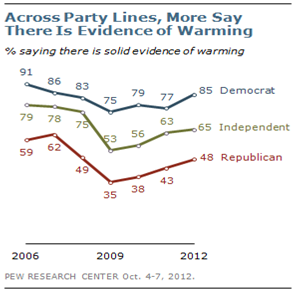If You Can’t Stand the Heat: Why Washington is Stuck on Climate Change (Part 1)
(This blog was first posted today on EDF Voices)

Image by Vinoth Chandar/Flickr
There is no point in being coy about this: The issue of climate change is polarized along partisan and ideological lines.
Democrats and progressives think it is a dangerous threat to the world. Most Republicans and conservatives think the threat is exaggerated, or doesn’t exist at all. The divide among politicians is even more striking – less than a third of Republicans in Congress responding to a 2011 National Journal survey said climate change is causing the Earth to warm.
Against this political backdrop, many critics say that groups like EDF, which seek to start a dialogue with conservatives on the issue, are naive. No conciliatory language, no middle-ground proposals, they say, will draw more than a few Republican votes in Congress. Conservative members of Congress will simply vote against us once Rush Limbaugh starts railing against the global warming “hoax”.
It’s a reasonable argument, but I think it misses an essential point: It may be hard to pass climate change legislation by working with conservatives, but it will be nearly impossible to do so without them. In fact, no major environmental law has ever been passed without large bi-partisan majorities. The Clean Air Act, the Clean Water Act, the National Environmental Policy Act, the 1990 Clean Air Act Amendments all passed with lots of votes from both major parties.
No important legislation can become law without sixty votes in the Senate. And I think you will search in vain for a respected political analyst who thinks there will be sixty progressive, pro-environment senators any time soon. On an issue that doesn’t allow for the long game – as the atmosphere loads with greenhouse gases and the ice caps melt – we can’t wait decades for that super-majority to appear.
That leaves us two choices: act without Congress, or open a conversation with conservatives and move towards an approach that can get widespread support. President Obama has already used his executive powers to limit greenhouses gases, including a clean cars rule and proposed standards for new power plants. We hope he will soon add pollution limits for existing power plants and policies to limit methane leakage from natural gas production.
All of that, along with actions by states like California’s AB 32, will be an important down payment on what we need to do. But in the long run it won’t be nearly enough to prevent the worst impacts of climate change. Nothing short of a comprehensive solution to shift America to cleaner energy, and lead the world that way, will suffice. And that means Congressional action.
Next: Why do many conservatives reject the consensus of scientists on climate change?













